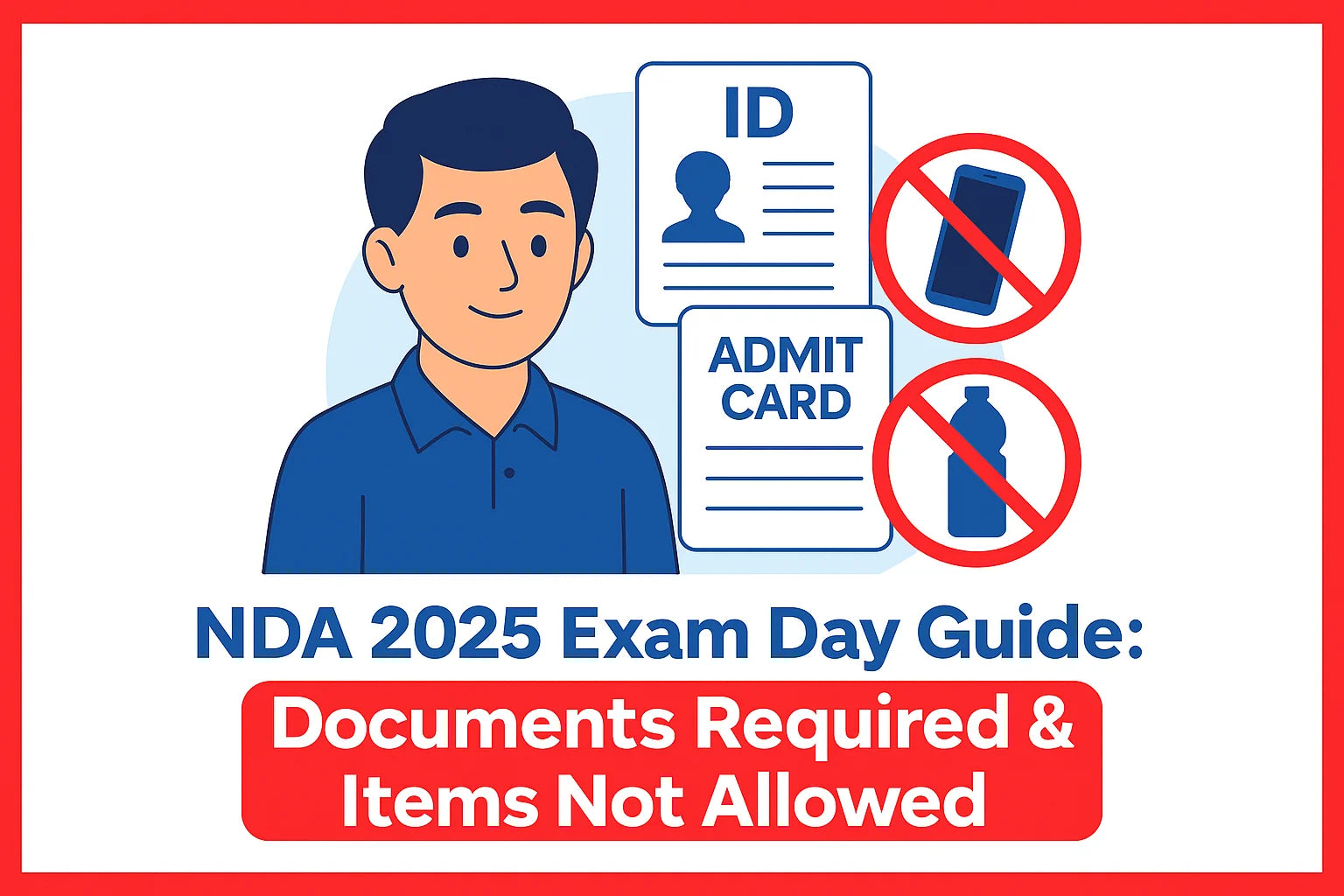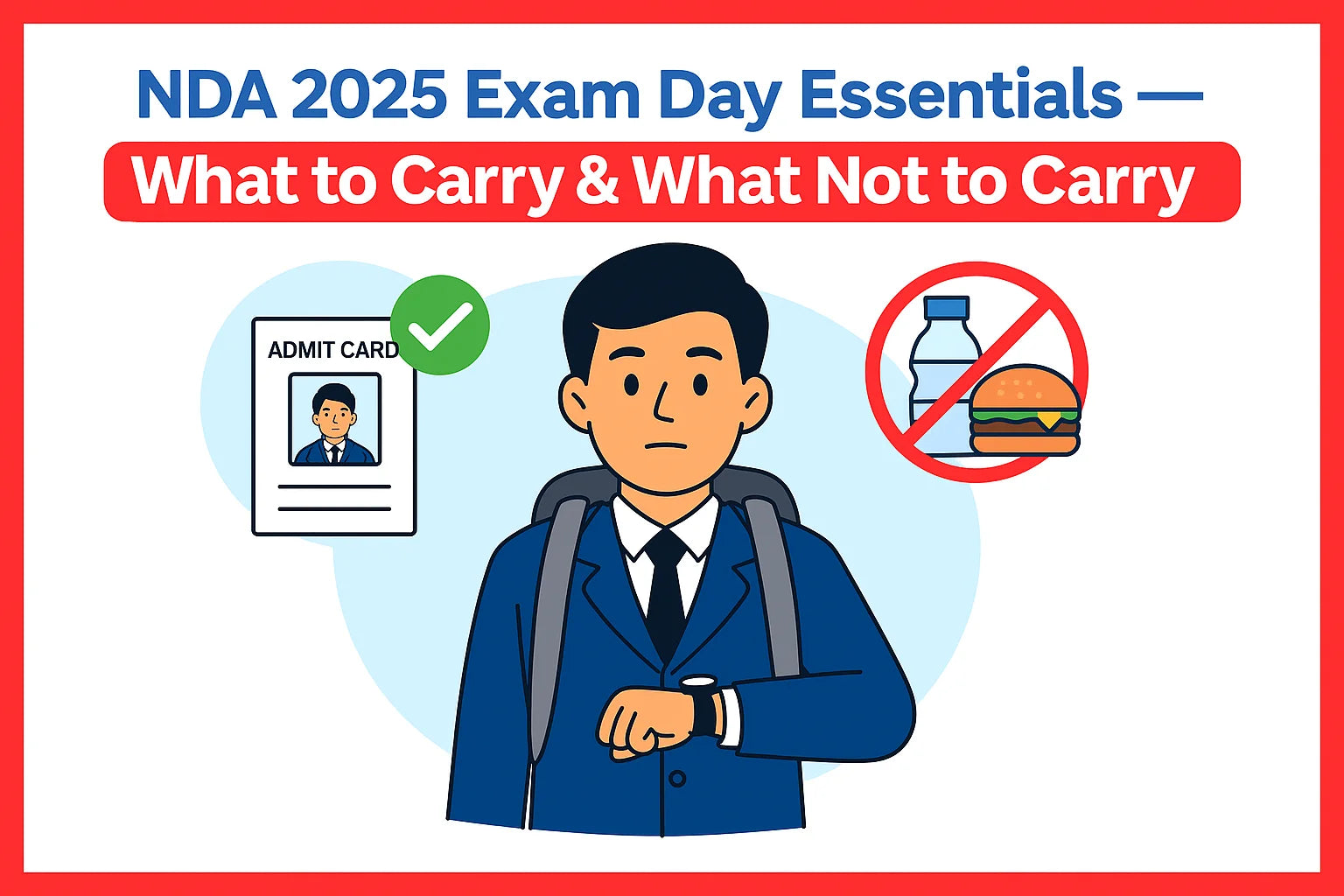Many aspirants overlook the English section in the NDA (National Defence Academy) exam. Yet it carries 50 marks of the 300 marks in Paper 2 (General Ability Test), and a good score in this section can make a big difference to your overall score. As opposed to other subjects like Mathematics or General Science, the English section evaluates your ability to understand, mastery of grammar, and the use of vocabulary.
You are either at the initial phase of preparation or you are finalizing the last round of revision, but you need to know what to learn and how to tackle the English part. Here in this blog, we are going to divide the NDA English syllabus into Grammar, Vocabulary, and Reading Comprehension. We will also give you some of the best strategies, tips, and mistakes to avoid so that you can be on point.
Importance of the English Section in the NDA Exam
The NDA exam comprises two papers:
|
Paper |
Subject |
Maximum Marks |
Duration |
|
Paper 1 |
Mathematics |
300 |
2.5 Hours |
|
Paper 2 |
General Ability Test (GAT) |
600 (English - 200 + GK - 400) |
2.5 Hours |
English takes 200 marks out of the 600 marks in GAT, and Grammar, Vocabulary, and Comprehension have a decisive role to play.
English: Not Just for Scoring, But for SSB Too
Knowledge of English can not only assist in the written examination but is also essential during SSB interviews, group discussions and communication training in NDA. Therefore, the emphasis on English creates long-term value.
What is the English Syllabus for NDA?
The English section in the NDA exam mainly evaluates:
-
Grammar and Usage
-
Vocabulary
-
Comprehension and Reading Skills
-
Sentence Improvement
-
Spotting Errors
-
Synonyms & Antonyms
-
Idioms and Phrases
-
Fill in the Blanks
In case you have read any of the NDA NA books or official syllabus published by UPSC, you will find that the English subjects are always the same.
In-depth Topic-Wise Strategy for English NDA Preparation
Let’s explore how to prepare for each segment effectively.
1. Grammar & Usage: Foundation of the English Section
Grammar questions form a large part of the English paper. You can expect questions from:
-
Subject-Verb Agreement
-
Tenses
-
Articles
-
Prepositions
-
Voice (Active/Passive)
-
Reported Speech
-
Sentence Structure
Tips:
-
Practice sentence correction and error spotting every day.
-
Use previous question papers to track recurring patterns.
-
Maintain a notebook of common grammar rules.
It has been noted by many aspirants that regular revision of the topics covered in a reliable NDA PYQ book assists in learning of the grammar rules.
Read More: What is the Safe Score for NDA Math Exam?
2. Vocabulary: Your Scoring Weapon
A strong vocabulary ensures better performance in fill-in-the-blank and synonym/antonym questions.
|
Vocabulary Components |
Examples |
|
Synonyms |
Happy – Joyful |
|
Antonyms |
Brave – Cowardly |
|
Idioms & Phrases |
Break the ice, Hit the sack |
|
Word Meanings |
From diverse domains |
|
Cloze Test Words |
Context-based fill-ins |
Tips:
• Study 10 new words every day along with their incorporation in sentences.
• Revise a new idiom and phrase once a week.
• Remember difficult words by using digital flashcards or sticky notes.
• To get confident, solve vocabulary exercises in your NDA English book.
3. Reading Comprehension: Increase Speed and Comprehension
The exam normally has 1 passage and 4-5 questions. The text tests your skills of reading quickly and understanding the context, tone, and facts.
Tips:
• Read the English newspapers or editorials.
• Use a timer when doing RCs.
• Emphasis on titles, transitions, and purpose of the author.
• Get rid of incorrect answers through logic, not assumptions.
How can I prepare for English Grammar for NDA?
To make an effective preparation of English grammar in NDA:
1. Learn the fundamentals: Start with the basic grammar rules: verb tenses, subject-verb agreement, tenses, and voice.
2. Daily practice: Spend at least 30-45 minutes a day on questions that are specifically grammar-related.
3. Study mistakes: Find a pattern in your mistakes and analyze them after each mock test or worksheet. Did you mix up tenses or use the wrong preposition?
4. PYQs: A good NDA PYQ book can assist you in solving grammar questions, and this will give you an idea of the actual exam patterns.
Use a structured source to practice to minimize the possibility of committing random grammatical errors. Grammar mastery is all about repetition.
How many vocabulary-based questions appear in NDA English?
The English section of the NDA usually contains 15-20 questions which are directly or indirectly linked to vocabulary. These include:
Synonyms/Antonyms: 4-5 questions
• Write in your own words- 4-5 questions
• Idioms and phrases: 3-4 questions
• Cloze test or use of words: 3-5 questions
The vocabulary is of medium difficulty, neither too hard nor something that you can guess without any knowledge. You can memorize new words by creating a curated list of any NDA NA book or by reading articles daily.
Can NDA English Comprehension be improved with practice?
Absolutely. Like Mathematics, comprehension is a skill that improves with:
-
Regular timed practice: Solve at least one passage daily from previous year papers or mock tests.
-
Backed reading: Read a paragraph first, then go to the questions. Return to the passage for each answer.
-
Speed reading: Focus on skimming techniques. Highlight main ideas or transition words.
For practice, rely on material from a comprehensive NDA English book where passages are designed to mimic exam-level difficulty.
Is the English section tough in NDA?
The English section is considered moderate. If you are from an English-medium background or have regularly studied English grammar and comprehension in school, it’s an opportunity to score.
Here’s how English compares to other sections:
|
Subject |
Level of Difficulty |
Recommended Focus Time |
|
Mathematics |
High |
3–4 hours daily |
|
English |
Moderate |
1 hour daily |
|
GK (Science, History, etc.) |
Moderate–High |
2–3 hours daily |
So while Mathematics and GK may be more challenging for many, the English section remains scoring—especially if you’ve practiced it using a structured plan and revised using mock tests and past papers from a reputed NDA general knowledge book or English module.
Best Preparation Strategy to Crack NDA English Section
Here’s a weekly sample schedule to balance all components:
|
Day |
Grammar Focus |
Vocabulary |
Reading Practice |
Revision |
|
Monday |
Tenses |
10 new words |
Short Editorial |
Grammar sheet |
|
Tuesday |
Prepositions |
Idioms |
RC passage |
Previous mistakes |
|
Wednesday |
Sentence Errors |
Synonyms |
News paragraph |
Mock test review |
|
Thursday |
Voice Change |
Antonyms |
Cloze Test |
Note revision |
|
Friday |
Articles |
10 new words |
Letter/Email Reading |
Spotting errors |
|
Saturday |
Reported Speech |
Mixed |
Practice test |
Flashcards |
|
Sunday |
Full Mock NDA |
Revision |
Video Explanation |
Doubt clearing |
Follow this schedule at least 6-8 weeks before the NDA exam and ensure that you are regularly working through questions from an authentic source, such as an NDA PYQ book.
Some of the Common Errors that NDA Aspirants Make in the English Section
1. Missing out on English: Most of the aspirants miss out on English, thinking that it is easy. That is erroneous.
2. Memorizing without practicing: Idioms or words memorized without applying them in a sentence will create confusion during the exam.
3. Failing to time comprehension: RCs are time-consuming. Do them in time limits.
4. Failure to revise rules: Rules in grammar die without practice.
5. Avoiding mock tests: You will be more accurate in case you test yourself regularly.
Practice Comprehensively with Oswaal360 Online Courses for the Latest NDA Exams
Practice Now with Free Oswaal360 Online Mock Test for the Latest NDA Exams
Final Thoughts
Mastering the English part in NDA is not a cramming game, but it is a game of regular exposure, revision, and revision with application. Be it grammar precision, vocabulary strength, or reading speed- these are the skills that need to be cultivated every day.
Too, when you use a complete NDA English book or go over questions in an NDA PYQ book regularly, you will find that you become more confident and your performance will improve noticeably. Complement your overall preparation with an NDA general knowledge book on the GAT part, but never keep the English part in the back seat.
Key Takeaways:
• Get 85-90 percent accuracy in English it can be done and it will improve your overall NDA ranking.
• Emphasis on rules + revision = memorization in grammar.
• Study words within a context and not in isolation.
• Reading should be an everyday routine, not a week-long exercise.
• Find out frequently asked topics using previous year papers.














